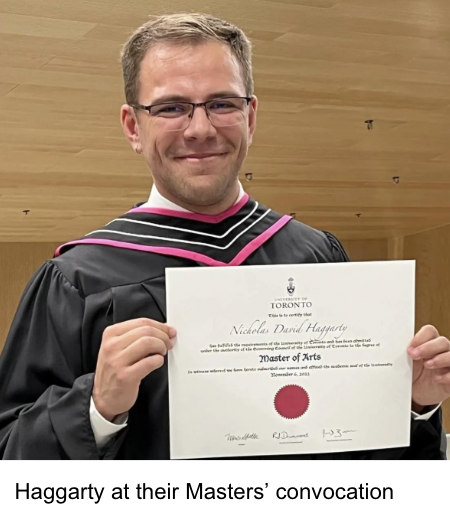
Some French words like, “quatre” (four) and “table,” have over time evolved to sound more like “quat-” or “tabl-,” as speakers “dop” that final segment.
Seems minor, right?
In 17th-century France, popular opinion held that people who pronounced words without that final segment were “peasants,” “uneducated.”
Sociolinguists often track such idiosyncrasies and their evolving meanings over time to get an understanding of the impact of language on culture. One such individual is Nicholas Haggarty (they/he), who studied historical perceptions of social class of people who spoke French with that particular identifier.
They made an interesting claim in response: it’s not a social class phenomenon or an indicator of education level, but rather, an identifier of Quebec and Montréal French.
Haggarty just finished their first year as a PhD student studying Sociolinguistics and Queer Linguistics with a background in both French and English. Having assisted on Professor Yoonjung Kang’s “Speech Rate Effects in French Stop Voicing Production and Perception,” Haggarty looks back on their works as constantly striving for an understanding of why people make the sounds they do, and why those sounds are perceived in the ways they are.
Their Master’s thesis studied the stereotypical “gay” voice, and whether there was a science-backed explanation for the phenomenon so commonly referred to in the media. Haggarty examined pitch and tone in a series of archived interviews with queer men of the 80s.
An inspiring individual who views their research as advocacy rooted in education, Haggarty’s work focuses on the stories we tell through not only our language, but the clues revealed by the linguistic forms we use.
What is queer linguistics?
Haggarty describes queer linguistics as relevant today due to societal interests in staying the hetero-normative course. To them, the field brings the queer community into the linguistics field, identifying elements of queerness and queer performance to define how people use language to root themselves in their identity.
An intersecting interest therein, Critical Discourse Analysis investigates parts of speech and what it means when we use them. For example, when we use Internet-slang or community-specific vernacular, are we showing relation or connection to ourselves or our community?
Haggarty’s magnum opus to date is their PhD, using a corpus of interviews with queer individuals in the Toronto area. He will study their oral histories to get an understanding of language that goes beyond phonetic analysis, including the various ways they perceive authenticity in their identity.
The best part about this? The resource will be public.
An unprecedented act of agency and advocacy, this database of oral histories of queer people in Canada is a way of teaching people how queerness is perceived in our corner of North America, and whether the lessons they teach us line up with research done in places like the United States. If not, perhaps there is something to be said about breaking down pervasive stereotypes.
As Haggarty says, “everything we do is a performance,” and their work in the field of queer linguistics seeks to decode its meanings and values.
To all those interested in the emerging field of queer linguistics, and to everyone else who values education and understanding above all else, keep an eye out for this exciting development in Haggarty’s work.
We all have something to learn by listening to each other’s stories and taking them on their own terms.








